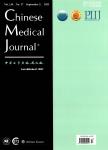Prophylactic treatment with growth hormone improves intestinal barrier function and alleviates bacterial translocation in stressed rats
Prophylactic treatment with growth hormone improves intestinal barrier function and alleviates bacterial translocation in stressed rats作者机构:Department of General Surgery Affiliated Hospital of Qingdao University Medical School Qingdao 266003 China Research Institute of General Surgery Nanjing University Medical School Nanjing Military Area the People ' s Liberation Army Nanjing 210002 China
出 版 物:《Chinese Medical Journal》 (中华医学杂志(英文版))
年 卷 期:2004年第17卷第2期
页 面:264-269页
核心收录:
学科分类:1007[医学-药学(可授医学、理学学位)] 1006[医学-中西医结合] 100706[医学-药理学] 100602[医学-中西医结合临床] 10[医学]
基 金:the foundation of the Institute of General Surgery
主 题:growth hormone stress damage intestinal barrier bacterial translocation lactulose/mannitol test
摘 要:Background Damage to the gut barrier often occurs during critical illnesses. In such cases, it is very important to alleviate impairment of the intestinal barrier and protect intestinal barrier function. This study investigated the protective effect of growth hormone on intestinal barrier function in rats under stress. Methods This study consisted of prospective, randomized, and controlled animal experiments. Twenty-five Sprague-Dawley rats served as total parenteral nutrition (TPN) models and were divided into three groups: TPN group, sepsis (Sep) group, and growth hormone (GH) group. Another 8 rats served as normal controls. Each group received different stress stimuli. Rats were fed for 7 days, and samples were taken for examination 24 hours after gavaging with dual saccharides. Results The architecture of the small intestinal mucosa in the Sep group showed the most severe damage among all groups. Nitric oxide levels in blood plasma and immunoglobulin A levels in the intestinal mucosa of the GH group were significantly lower than in the Sep group (P0. 02). There were no significant changes in CD3 counts and in the CD4/CD8 ratio between the four groups. Dual sugar tests and bacteriological examinations revealed that intestinal permeability and rate of bacterial translocation in the GH group were lower than in the Sep group (P0. 01, respectively). Conclusion Prophylactic treatment with growth hormone can alleviate damage to intestinal barrier function caused by trauma and endotoxemia in rats under stress.



